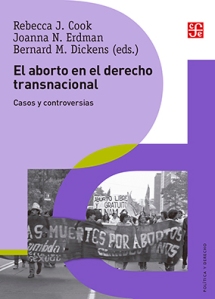Congratulations to Leticia Bonifaz Alfonzo and Rosalba Mora Sierra, whose article on the 2023 decriminalization of abortion by the Mexican Supreme Court was recently published in the “Ethical and Legal Issues” section of the International Journal of Gynecology and Obstetrics, and is now freely available. Leticia Bonifaz Alfonzo, a member of the UN CEDAW committee, is affiliated with the National Autonomous University of Mexico (UNAM) in Mexico City. Rosalba Mora Sierra is Director of Access to Justice at the General Unit of Scientific Knowledge and Human Rights, Mexican Supreme Court in Mexico City. The article is now freely available online:
Leticia Bonifaz Alfonzo and Rosalba Mora Sierra, “Decriminalization of Abortion by the Mexican Supreme Court,” International Journal of Gynecology and Obstetrics 165.1 (April 2024): 375–381.
Article and Abstract Online. Spanish translation of Abstract by CLACAI .
ABSTRACT: In September 2021, the Mexican Supreme Court issued a decision disallowing any federal or local judicial authority to indict someone for the offense of voluntary or consensual abortion. This decision also declared unconstitutional penalties imposed on medical personnel who facilitate or assist such procedures. Furthermore, the Court decided that limiting access to abortion in cases of rape to a specific time frame was disproportionate. Later on, in September 2023, the Supreme Court confirmed that absolute criminalization of abortion was unconstitutional and declared that the rule supporting criminalization in the Federal Penal Code was without effects. Consequently, healthcare providers who work in public federal health institutions cannot be criminalized for guaranteeing the right to abortion. This article reviews the reasons advanced by the Supreme Court to guarantee the right of reproductive self-determination, as well as the effects of both decisions beyond the decriminalization of abortion by Mexican federal and state legislatures. The paper also examines the scope and limitations of these rulings and identifies the remaining challenges regarding voluntary abortion procedures in Mexico.
The entire article can be read or downloaded here: Article and Abstract Online.
Spanish translation of Abstract by CLACAI.
OTHER RELEVANT RESOURCES:
The new Mexican decision: Suprema Corte de Justicia de la Nación [Supreme Court], 2023. Review of Constitutional Protection. Amparo en revisión 267/2023. Sept. 6, 2023.Speaker: Justice Ana Margarita Ríos Farjat. Decided in the session of September 6, 2023. Official Press release in Spanish. Decision in Spanish.
“Recursos Jurídicos” del RepoCLACAI – For a comprehensive and searchable database of legal resources on abortion care in Latin America, visit the Legal Section of the CLACAI Repository “Recursos Juridicos” online.
Abortion Law Decisions webpages, now updated in English and in Spanish.
Ethical and Legal Issues in Reproductive Health – more than 110 other concise articles are online here.
________________________________________________________________________________________
Contributed by: The International Reproductive and Sexual Health Law Program, reprohealth*law at utoronto.ca. See Program website for our Publications, Research resources, and Reprohealthlaw Commentaries Series. TO JOIN THE REPROHEALTHLAW BLOG: enter your email address in the upper right corner of this blog, then check your email to confirm the subscription.



 Posted by reprohealthlaw
Posted by reprohealthlaw 



